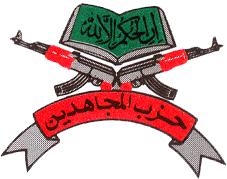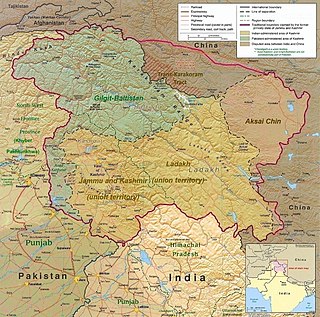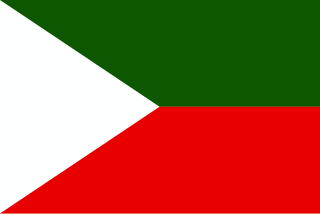Related Research Articles

Harkat-ul-Mujahideen- al-Islami is a Pakistan-based Islamic jihad group operating primarily in Kashmir. The group have been considered as having links to Osama bin Laden and Al-Qaeda.

Hizb-ul-Mujahideen is an Islamist militant group operating in Indian-administered Kashmir. Its goal is to separate Kashmir from India and merge it with Pakistan. The group has claimed responsibility for multiple attacks in India.

The insurgency in Jammu and Kashmir is against the Indian administration of Jammu and Kashmir, a region constituting the southern portion of the larger Kashmir region, which has been the subject of a dispute between India and Pakistan since 1947.

The Jammu Kashmir Liberation Front (JKLF) is a militant separatist organization active in both the Indian-administered and Pakistani-administered territories of Kashmir. It was founded by Amanullah Khan, with Maqbool Bhat also credited as a co-founder. Originally a militant wing of the Azad Kashmir Plebiscite Front, the organization officially changed its name to the Jammu Kashmir Liberation Front in Birmingham, England on 29 May 1977; from then until 1994 it was an active Kashmiri militant organization. The JKLF first established branches in several cities and towns of the United Kingdom and other countries in Europe, as well as in the United States and across the Middle East. In 1982, it established a branch in the Pakistani-administered territory of Azad Jammu and Kashmir, and by 1987, it had established a branch in the Indian-administered Kashmir Valley.
The United Jihad Council, also known as the Muttahida Jihad Council (MJC), is a Islamist Jihadist organisation formed by the Pakistan Army for unified command and control over the anti-Indian militant groups operating in Jammu and Kashmir. It was formed in the summer of 1994 and is currently headed by Syed Salahuddin, the leader of Hizb-ul-Mujahideen. The organisation was created to unify and focus efforts of various armed militant groups fighting against the Indian rule in Kashmir. This made distribution of resources like arms, ammunition, propaganda materials and communications more streamlined. It also made it easier to coordinate and pool resources of various militant groups to collect information, plan operations and strike at targets of military importance inside Indian administered Kashmir.
Mushtaq Ahmed Zargar is a Kashmiri militant active in the Kashmiri insurgency, and founder of the militant outfit Al-Umar Mujahedeen. He spent considerable time in an Indian prison and was released in the aftermath of the Indian Airlines flight 814 hijacking. He currently lives in Pakistan.

Yasin Malik is a Kashmiri separatist leader and former militant who advocates the separation of Kashmir from both India and Pakistan. In March 2020, Malik was charged for the murder of four Indian Air Force personnel during an attack in 1990 and is currently under trial. He is also facing trial for the kidnapping of Rubaiyya Sayeed. He is currently lodged in Tihar jail.

Al-Badr is an Islamic militant group operating in the Kashmir region. The group was allegedly formed by the Pakistani Inter-Services Intelligence (ISI) in June 1998. It is believed the group was encouraged by the ISI to operate independently from their previous umbrella group, Hizb-ul-Mujahideen (HM). Prior to the group's separation from HM, they participated in the fighting in Afghanistan in 1990 as part of Gulbuddin Hekmatyar's Hizb-l-Islami (HIG) alongside other anti-Soviet Afghan mujihadeen. India and the United States have declared it a terrorist organisation and banned it.
Ikhwan force, popularly referred to as the Ikhwan and locally known as "naabedh", was a pro-government militia in the Indian Administrated Jammu and Kashmir, composed of surrendered Kashmiri militants.
Muhammad Ahsan Dar is an Indian Kashmiri separatist leader from Jammu and Kashmir, India. He is known as the founder and former head of the Islamist separatist militant organisation Hizbul Mujahideen and later become ameer of Muslim Mujahideen groups under the support of Pakistani intelligence to traning of muslims to jihad against India,Israel,United States.

The Exodus of Kashmiri Hindus, also known as the Exodus of Kashmiri Pandits, refers to the emigration of Hindus out of the Kashmir Valley, which is a region that has been administered by India since 1947 and is a part of the larger Kashmir region that has been the subject of a dispute between India and Pakistan from approximately the same time.
Masarat Alam Bhat is a Kashmiri separatist leader and chairman of the Jammu Kashmir Muslim League and also serving as chairman of the Hurriyat Conference, the umbrella organization of the separatists in Kashmir. He was appointed as chairman of Hurriyat Conference after the death of Syed Ali Shah Geelani. He played a significant role in the 2010 Kashmir stone pelting rallies which broke out against the Machil encounter carried out by the Indian Army in Kashmir. Government has booked Masrat Alam in 27 criminal cases but in most of these he has either been exonerated or bailed out by the courts and was released after Mufti Mohammad Sayeed took over as the Chief Minister of Jammu and Kashmir on 1 March 2015. He was detained under the controversial Public Safety Act and was in March 2015 released which caused a major political controversy and dominated Indian Parliament Proceedings. Amid speculations over his release Masrat Aalam said that no deal was made between him and the Chief Minister Mufti Mohammad Sayeed, saying "I spent more than four years in prison and during all these years I challenged the grounds of my 'illegal' detention". He has been Jailed for 17 years and has around 27 cases against him.

Abdul Majeed Dar was a leader of the people of Kashmir and the former chief commander of the militant group Hizbul Mujahideen in Jammu & Kashmir till 2001. He has been described as a "sane voice in J&K who realized the futility of the gun". He later gave up violence and sought to restore peace in Kashmir.

Burhan Muzaffar Wani was a Kashmiri Islamist Rebel militant and Top commander of Hizbul Mujahideen an Islamist militant organization active in Indian-administered Jammu and Kashmir
Farooq Ahmed Dar, also known by his nom de guerre Bitta Karate, is the current chairman of Jammu Kashmir Liberation Front and a former Kashmiri militant.
Zakir Rashid Bhat was an kashmiri Islamist most wanted militant in kashmir after the killing of Burhan Wani and Sabzar Bhat who was the former commander of Hizbul Mujahideen and chief of Ansar Ghazwat-ul-Hind.
Sabzar Ahmad Bhat was area commander of the militant organisation Hizbul Mujahideen. He was killed in an encounter by the police on 26 May 2017.

The 2017 Nowhatta mob lynching, was the lynch mob murder and mutilation of an on-duty undercover Indian Police officer in J&K Muhammad Ayub Pandith, on the Muslim holy night of Laylat al-Qadr on Thursday 22 June 2017 by a mob in Nowhatta after a crowd shouted slogans in favor of Pakistan as well as al-Qaida jihadist Zakir Musa. Sajjad Ahmad Gilkar, a Hizbul Mujahideen militant, had played a key role in the lynching according to the state police.
Riyaz Ahmad Naikoo was one of the top ten most wanted militants in Jammu and Kashmir affiliated with the Hizb-ul-Mujahideen. He was killed in an encounter with Indian security forces on 6 May 2020.
References
- ↑ International Crisis Group (2002), Kashmir: Confrontation and Miscalculation, International Crisis Group, p. 6
- ↑ Snedden, Christopher (2013) [first published as The Untold Story of the People of Azad Kashmir, 2012]. Kashmir: The Unwritten History. HarperCollins India. p. 198. ISBN 978-9350298985.
- ↑ PTI (8 June 2012). "Hizb chief Syed Salahuddin warns Pakistan against withdrawing support on Kashmir". The Times of India . Retrieved 8 June 2012.
- 1 2 "Normalization of Indo-Pak ties hurts Kashmir cause: Salahuddin". Arab News . 8 June 2012. Retrieved 8 June 2012.
- ↑ Diplomat, Kunwar Khuldune Shahid, The. "Time for Pakistan to Cut Ties With Hizbul Mujahideen". The Diplomat. Retrieved 27 June 2017.
- ↑ Pike, John. "Hizb-ul-Mujahideen". www.globalsecurity.org. Retrieved 27 June 2017.
- 1 2 "State Department Terrorist Designations of Mohammad Yusuf Shah AKA Syed Salahuddin". U.S. Department of State. Retrieved 27 June 2017.
- ↑ Siddiqui, AP | Naveed (26 June 2017). "Kashmiri militant leader punished as Modi visits US". DAWN.COM. Retrieved 27 June 2017.
- ↑ Bloeria, Conflicts in Jammu and Kashmir 2012.
- ↑ "State Department Terrorist Designations of Mohammad Yusuf Shah AKA Syed Salahuddin".
- ↑ "India stands vindicated as US names Hizbul chief Syed Salahuddin 'global terrorist'".
- ↑ "Top Kashmiri militant sees 'India-US-Israel nexus' behind his terrorist designation - The Express Tribune". The Express Tribune. 1 July 2017. Retrieved 3 July 2017.
- ↑ "In TV Interview, Hizbul Mujahideen's Syed Salahuddin Exposes Pakistan's Role In Terror". NDTV.com. Retrieved 3 July 2017.
- ↑ "Blacklisted Kashmiri Leader Vows To Continue Fight Over Kashmir | TOLOnews". TOLOnews. Retrieved 3 July 2017.
- ↑ Express Web Desk (30 June 2017), "Who is Syed Salahuddin, chief of Hizbul Mujahideen?", Indian Express. Retrieved 7 May 2019.
- 1 2 3 PTI (8 June 2012). "Hizb chief Syed Salahuddin warns Pakistan against withdrawing support on Kashmir". The Times of India . Archived from the original on 17 June 2013. Retrieved 8 June 2012.